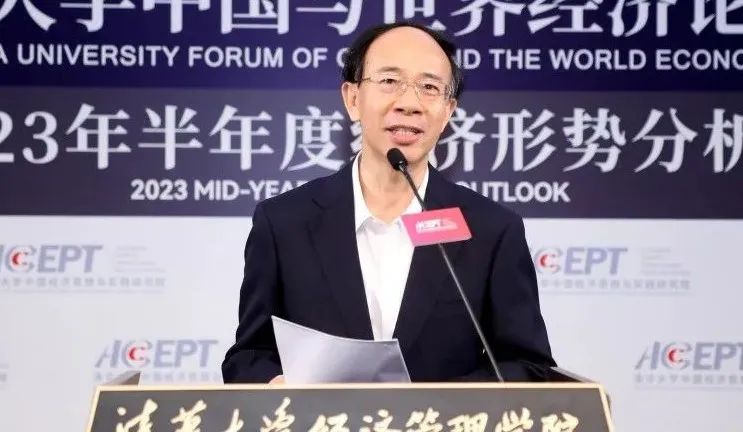Yin Yanlin: Weak aggregate demand and growing contradictions in the wider economy require urgent policy readjustment
The following is a summary of Yin Yanlin's keynote address to attendees at the 45th Tsinghua University Forum on China and the World Economy held at Tsinghua University, Beijing, on June 17, 2023. Yin is the Vice Chairman of the Economic Committee for the 14th National Committee of the Chinese People's Political Consultative Conference and former Deputy Director of the Office of the Central Financial and Economic Affairs Commission.
On June 17, 2023, the 45th Tsinghua University Forum on China and the World Economy, hosted by Tsinghua University's Academic Center for Chinese Economic Practice and Thinking (ACCEPT) in partnership with the university's School of Social Sciences and School of Economics and Management, was held on campus. The Vice Chairman of the Economic Committee for the 14th National Committee of the Chinese People's Political Consultative Conference, Yin Yanlin, who formerly served as Deputy Director of the Office of the Central Financial and Economic Affairs Commission, delivered a keynote address to attendees at the forum.

On June 17, 2023, the 45th Tsinghua University Forum on China and the World Economy was held inside the Weilun Building’s main lecture hall on campus at Tsinghua University’s School of Economics and Management. The biannual event was hosted by Tsinghua University’s Academic Center for Chinese Economic Practice and Thinking (ACCEPT) under the theme of "2023 Mid-Year Economic Outlook." During the forum’s proceedings, Yin Yanlin, Vice Chairman of the Economic Committee for the 14th National Committee of the Chinese People's Political Consultative Conference and former Deputy Director of the Office of the Central Financial and Economic Affairs Commission, delivered a keynote speech on the current macroeconomic situation in China.
Yin Yanlin stated that the current trend for China’s economic performance does not lend itself to an optimistic forecast, with downside risks rising and the foundations for the ongoing economic recovery clearly remaining on shaky ground, which is far removed from the overall improvements to economic operations that were proposed at the previous Central Economic Work Conference, especially regarding the requirements for ensuring the stable development of the real estate market. The specific manifestations in the broader economy are as follows: in terms of production, most industries have witnessed steady declines recently despite maintaining a relatively stable development trend overall, and with a notable divergence between sectors. The recovery has been uneven, with the service sector bouncing back faster than the industrial sector, larger enterprises faring better than small and medium-sized enterprises (SMEs), and state-owned enterprises (SOEs) outperforming private enterprises. In terms of demand, total retail sales for consumer goods have decreased year-on-year after an initial resurgence, while the consumption of durable goods and other major household purchases such as home appliances and automobiles has remained sluggish. Moreover, sales of commercial housing properties and fixed investments in productive assets have both decreased year-on-year after tapering off. Real estate development investments, private investments and exports have all declined, while the general employment and price level situations remain quite grim.
At present, the main reason why aggregate demand remains weak and the economy has flagged in its recovery is a result of inadequacies in policy implementation. On the one hand, market expectations in the form of consumer and private investment confidence have not followed a continuous path towards improvement; and on the other hand, there are obstacles preventing policies from being put into full effect, including restrictive policies that are hindering the free flow expansion of consumer demand and the development of enterprises. At the same time, any signaling towards making policy readjustments has also been characterized by a situation of uncertainty, while the income growth prospects for government entities, businesses and individuals are continuing to be impacted to an appreciable extent.
Therefore, the scope of policy support must be increased while providing assurances that such measures will be caried out fully and effectively. This will boost market expectations and stabilize market confidence, in this way stimulating the resilience of financial institutions, restoring and expanding demand, and promoting an overall improvement in economic activity. In particular, certain measures need to be introduced to put a decisive stop to the downward spiral in expectations among private enterprises and entrepreneurs: including effectively capitalizing on those policies that can be brought to bear to the greatest extent possible, putting into force any appropriate policies that have yet to be carried out by devising concrete and explicit measures for immediate execution, readjusting those policies incompatible with present needs as soon as possible, and expediting the implementation of those policies that should be strengthened, all while explicitly refraining from any hesitancy when moving forward with such measures. At the same time, the role of fiscal policy should be actively incorporated to further consolidate expectations and expand domestic demand, which would help enhance the effects of monetary policy while propping up and stimulating market demand.
Finally, it is necessary at present to effectively ensure that there is an overall convergence in the steering of public opinion, including attending to any statements, practices or measures associated with local government counterparts that are inconsistent with the requirements of the central government. This involves reinforcing forward-looking guidance and providing society with clear-cut expectations, as well as encouraging a climate of public opinion in which “state-owned enterprises dare to take action, private enterprises dare to forge ahead, and foreign enterprises dare to invest.”




